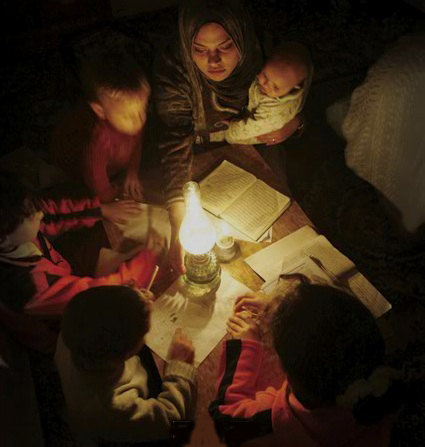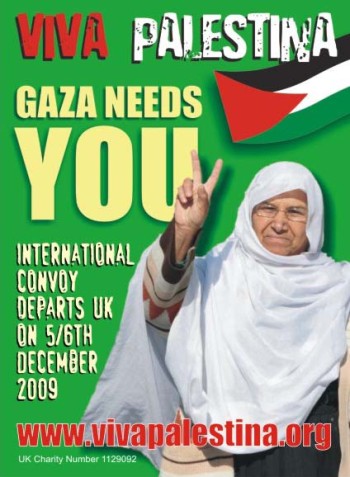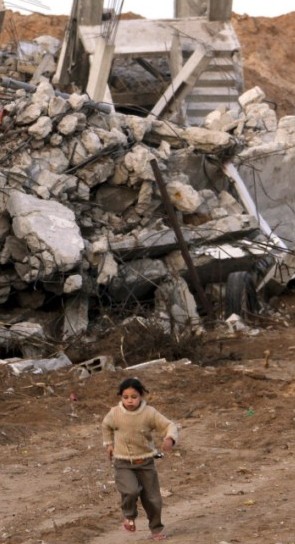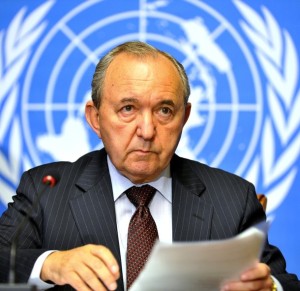“There are a number of other post-conflict issues in Gaza that need to be addressed. The land is dying. There are toxic deposits from all the munitions that have been dropped. There are serious issues with water—its depletion and its contamination. There is a high instance of nitrates in the soil that is especially dangerous to children. If these issues are not addressed, Gaza may not even be habitable by World Health Organization norms.” — Colonel Desmond Travers, one of the four members of the United Nations Fact Finding Mission on the Gaza Conflict, interviewed by Ken Silverstein.
Rabid opposition to the Goldstone report reached a hyperbolic peak this week when the Simon Wiesenthal Center referred to this serious legal finding as “the ‘Magna Carta’ of international terrorists”.
The UN General Assembly is set to debate the report on Wednesday and in so doing will further enhance the legitimacy of what has already become a highly influential document.
As Israel has framed the issue, the legitimization of Goldstone is part of a campaign to delegitimize the Jewish state. But on the contrary, in recognition of the effectiveness of Israel’s own legal system, the Goldstone report has called on Israel “to launch appropriate investigations that are independent and in conformity with international standards, into the serious violations of International humanitarian and International Human Rights Law reported by the Mission and any other serious allegations that might come to its attention.”
Goldstone categorically rejects that assertion: “The allegation that Hamas was able to shape the findings of my report or that it pre-screened the witnesses is devoid of truth. I challenge anyone to produce evidence in support of it.”
What follows is Justice Goldstone’s letter where clause by clause he exposes the flaws in the House resolution:
The Honorable Howard Berman
Chairman, House Committee on Foreign Affairs
The Honorable Ileana Ros-Lehtinen
Ranking Member, House Committee on Foreign Affairs
October 29, 2009
Dear Chairman Berman and Ranking Member Ros-Lehtinen,
It has come to my attention that a resolution has been introduced in the Unites States House of
Representatives regarding the United Nations Fact Finding Mission on the Gaza Conflict, which I
led earlier this year.
I fully respect the right of the US Congress to examine and judge my mission and the resulting
report, as well as to make its recommendations to the US Executive branch of government.
However, I have strong reservations about the text of the resolution in question – text that
includes serious factual inaccuracies and instances where information and statements are taken
grossly out of context.
I undertook this fact-finding mission in good faith, just as I undertook my responsibilities vis à
vis the South African Standing Commission of Inquiry Regarding Public Violence and
Intimidation, the International War Crimes Tribunal on the former Yugoslavia, the International
Criminal Tribunal for Rwanda, the International Panel of the Commission of Enquiry into the
Activities of Nazism in Argentina, the Independent International Commission on Kosovo, and the
Volker Committee investigation into the UN’s Iraq oil-for-food program in 2004/5.
I hope that you, in similar good faith, will take the time to consider my comments about the
resolution and, as a result of that consideration, make the necessary corrections.
Whereas clause #1: “Whereas, on January 12, 2009, the United Nations Human Rights Council passed Resolution A/HRC/S-9/L.1, which authorized a `fact-finding mission’ regarding Israel’s conduct of Operation Cast Lead against violent militants in the Gaza Strip between December 27, 2008, and January 18, 2009;”
This whereas clause ignores the fact that I and others refused this original mandate, precisely
because it only called for an investigation into violations committed by Israel. The mandate given
to and accepted by me and under which we worked and reported reads as follows:
“. . .to investigate all violations of international human rights law and international humanitarian
law that might have been committed at any time in the context of the military operations that
were conducted in Gaza during the period from 27 December 2008 and 18 January 2009, whether
before, during or after”.
Whereas clause #2: “Whereas the resolution pre-judged the outcome of its investigation, by one-sidedly mandating the `fact-finding mission’ to `investigate all violations of international human rights law and International Humanitarian Law by . . . Israel, against the Palestinian people . . . particularly in the occupied Gaza Strip, due to the current aggression’”
This whereas clause ignores the fact that the expanded mandate that I demanded and received
clearly included rocket and mortar attacks on Israel and as the report makes clear was so
interpreted and implemented. It was the report carried out under this broadened mandate – not the
original, rejected mandate – that was adopted by the Human Rights Council and that included the
serious findings made against Hamas and other militant Palestinian groups.
Whereas clause #3: “Whereas the mandate of the `fact-finding mission’ makes no mention of the relentless rocket and mortar attacks, which numbered in the thousands and spanned a period of eight years, by Hamas and other violent militant groups in Gaza against civilian targets in Israel, that necessitated Israel’s defensive measures;”
This whereas clause is factually incorrect. As noted above, the expanded mandate clearly
included the rocket and mortar attacks. Moreover, Chapter XXIV of the Report considers in
detail the relentless rocket attacks from Gaza on Israel and the terror they caused to the people
living within their range. The resulting finding made in the report is that these attacks constituted
serious war crimes and possibly crimes against humanity.
Whereas clause #4: “Whereas the `fact-finding mission’ included a member who, before joining the mission, had already declared Israel guilty of committing atrocities in Operation Cast Lead by signing a public letter on January 11, 2009, published in the Sunday Times, that called Israel’s actions `war crimes’;”
This whereas clause is misleading. It overlooks, or neglects to mention, that the member concerned, Professor Christine Chinkin of the London School of Economics, in the same letter, together with other leading international lawyers, also condemned as war crimes the Hamas rockets fired into Israel.
Whereas clause #5: “Whereas the mission’s flawed and biased mandate gave serious concern to many United Nations Human Rights Council Member States which refused to support it,
including Bosnia and Herzegovina, Cameroon, Canada, France, Germany, Italy, Japan, the Netherlands, the Republic of Korea, Slovakia, Slovenia, Switzerland, Ukraine, and the United Kingdom of Great Britain and Northern Ireland;”
This whereas clause is factually incorrect. The mandate that was given to the Mission was certainly not opposed by all or even a majority of the States to which reference is made. I am happy to provide further details if necessary.
Whereas clause #6: “Whereas the mission’s flawed and biased mandate troubled many distinguished individuals who refused invitations to head the mission;”
This whereas clause is factually incorrect. The initial mandate that was rejected by others who
were invited to head the mission was the same one that I rejected. The mandate I accepted was
expanded by the President of the Human Rights Council as a result of conditions I made.
Whereas clause #8: “Whereas the report repeatedly made sweeping and unsubstantiated determinations that the Israeli military had deliberately attacked civilians during Operation Cast Lead;”
This whereas clause is factually incorrect. The findings included in the report are neither “sweeping” nor “unsubstantiated” and in effect reflect 188 individual interviews, review of more than 300 reports, 30 videos and 1200 photographs. Additionally, the body of the report contains a plethora of references to the information upon which the Commission relied for our findings.
Whereas clause #9: “Whereas the authors of the report, in the body of the report itself, admit that `we did not deal with the issues . . . regarding the problems of conducting military operations in civilian areas and second-guessing decisions made by soldiers and their commanding officers `in the fog of war.’;”
This whereas clause is misleading. The words quoted relate to the decision we made that it would have been unfair to investigate and make finding on situations where decisions had been made by Israeli soldiers “in the fog of battle”. This was a decision made in favor of, and not against, the interests of Israel.
Whereas clause #10: “Whereas in the October 16th edition of the Jewish Daily Forward, Richard Goldstone, the head of the `United Nations Fact Finding Mission on the Gaza Conflict’, is quoted as saying, with respect to the mission’s evidence-collection methods, `If this was a court of law, there would have been nothing proven.’”
The remark as quoted is both inaccurate and taken completely out of context. What I had explained to The Forward was that the Report itself would not constitute evidence admissible in court of law. It is my view, as jurist, that investigators would have to investigate which allegations they considered relevant. That, too, was why we recommended domestic investigations into the allegations.
Whereas clause #11: “Whereas the report, in effect, denied the State of Israel the right to self- defense, and never noted the fact that Israel had the right to defend its citizens from the repeated violent attacks committed against civilian targets in southern Israel by Hamas and other Foreign Terrorist Organizations operating from Gaza;”
It is factually incorrect to state that the Report denied Israel the right of self-defense. The report examined how that right was implemented by the standards of international law. What is commonly called ius ad bellum, the right to use military force was not considered to fall within our mandate. Israel’s right to use military force was not questioned.
Whereas clause #12: “Whereas the report largely ignored the culpability of the Government of Iran and the Government of Syria, both of whom sponsor Hamas and other Foreign Terrorist Organizations;”
This whereas clause is misleading. Nowhere that I know of has it ever been suggested that the Mission should have investigated the provenance of the rockets. Such an investigation was never on the agenda, and in any event, we would not have had the facilities or capability of investigating these allegations. If the Government of Israel has requested us to investigate that issue I have no doubt that we have done our best to do so.
Whereas clause #14: “Whereas, notwithstanding a great body of evidence that Hamas and other violent Islamist groups committed war crimes by using civilians and civilian institutions, such as mosques, schools, and hospitals, as shields, the report repeatedly downplayed or cast doubt upon that claim;”
This is a sweeping and unfair characterization of the Report. I hope that the Report will be read by those tasked with considering the resolution. I note that the House resolution fails to mention that notwithstanding my repeated personal pleas to the Government of Israel, Israel refused all cooperation with the Mission. Among other things, I requested the views of Israel with regard to the implementation of the mandate and details of any issues that the Government of Israel might wish us to investigate.
This refusal meant that Israel did not offer any information or evidence it may have collected regarding actions by Hamas or other Palestinian groups in Gaza. Any omission of such information and evidence in the report is regrettable, but is the result of Israel’s decision not to cooperate with the Fact-Finding mission, not a decision by the mission to downplay or cast doubt on such information and evidence.
Whereas clause #15: “Whereas in one notable instance, the report stated that it did not consider the admission of a Hamas official that Hamas often `created a human shield of women, children, the elderly and the mujahideen, against [the Israeli military]’ specifically to `constitute evidence that Hamas forced Palestinian civilians to shield military objectives against attack.’;”
This whereas clause is misleading, since the quotation is taken out of context. The quotation is
part of a section of the report dealing with the very narrow allegation that Hamas compelled
civilians, against their will, to act as human shields. The statement by the Hamas official is
repugnant and demonstrates an apparent disregard for the safety of civilians, but it is not evidence
that Hamas forced civilians to remain in their homes in order to act as human shields. Indeed,
while the Government of Israel has alleged publicly that Hamas used Palestinian civilians as
human shields, it has not identified any cases where it claims that civilians were doing so under
threat of force by Hamas or any other party.
Whereas clause #16: “Whereas Hamas was able to significantly shape the findings of the investigation mission’s report by selecting and prescreening some of the witnesses and intimidating others, as the report acknowledges when it notes that `those interviewed in Gaza appeared reluctant to speak about the presence of or conduct of hostilities by the Palestinian armed groups . . . from a fear of reprisals’;”
The allegation that Hamas was able to shape the findings of my report or that it pre-screened the
witnesses is devoid of truth. I challenge anyone to produce evidence in support of it.
Sincerely,
Justice Richard J. Goldstone
 he question was like an electric shock to the six or so Palestine solidarity activists, including myself, as we were standing inside a classroom at a school in Gaza City.
he question was like an electric shock to the six or so Palestine solidarity activists, including myself, as we were standing inside a classroom at a school in Gaza City.
 n March 9,
n March 9,  “We were disturbed by the lethality and toxicity of weapons used in Gaza, some of which have been in Western arsenals since the Cold War, such as white phosphorous, which incinerated 14 people, including several children in one attack; flechettes, small darts that are designed to tumble upon entering human flesh in order to cause maximum damage, strictly in breach of the Geneva Convention; and highly carcinogenic tungsten shrapnel and dime munitions, which contain tungsten in powder form. There is also a whole cocktail of other problematic munitions suspected to have been used.
“We were disturbed by the lethality and toxicity of weapons used in Gaza, some of which have been in Western arsenals since the Cold War, such as white phosphorous, which incinerated 14 people, including several children in one attack; flechettes, small darts that are designed to tumble upon entering human flesh in order to cause maximum damage, strictly in breach of the Geneva Convention; and highly carcinogenic tungsten shrapnel and dime munitions, which contain tungsten in powder form. There is also a whole cocktail of other problematic munitions suspected to have been used. o the innocent refuse to be questioned?
o the innocent refuse to be questioned?